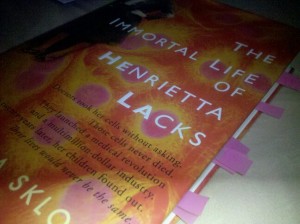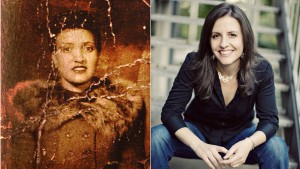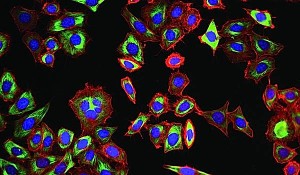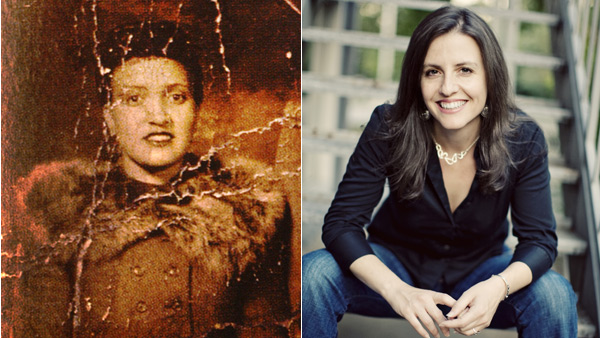This book emotionally drained me.
Yet, I couldn’t bear to put it down.
 Yes, those are note tabs. I’m a nerd.
Yes, those are note tabs. I’m a nerd.
I first heard about this book from my ChocolateBrides family. So many of the ladies were adding it to their reading lists, that I had to investigate. Once I saw the subject matter, how one black woman’s cells became the nucleus of modern medicine without her knowledge, I couldn’t contain my excitement. I went quickly to reserve it at my local library.
Ms. Skloot did an excellent job of nailing the black-speak given by Henrietta’s family. I was equally gratified with her ability to provide just enough back-story to engage us in not only what her cells became, but who Henrietta was. There were times very early in the book that I found myself weeping for this woman, whose story, though I’d never heard it before, was somehow familiar to me. I was infatuated with the world surrounding HeLa, the name given to Henrietta’s cells. Cells that eventually were used to develop vaccines and medicines for cervical cancer and HPV, flown into space, and blown up in atom bombs. I would encourage anyone with a passion for good story, medicine, and a trip down a rabbit hole, to visit the library and check this book out. I was severely impressed.

Aside from the book itself, and the significance of Henrietta Lacks as a person, this story provided a great springboard into my philosophies on African Americans and medical professionals. While the issue of infertility was only discussed briefly in this book, reproductive health was a huge factor as Henrietta’s initial condition was cervical cancer, most likely caused by HPV. The fear and confusion created by a lack of medical literacy is profound in this tale, and is something I am frequently ranting about.
In 1951, when Mrs. Henrietta Lacks was diagnosed with cervical cancer, she began treatments at Johns Hopkins. I was taken aback to read that doctors had not informed her of the infertility those treatments would leave her with. Quite similar to the ignorance exhibited by some today in regards to cancer treatments and fertility, Henrietta had no idea the two were related. Ms. Skloot quoted this note by Dr. Richard TeLinde, however, the very doctor who did not inform Henrietta:
“The psychic affect of hysterectomy, especially on the young, is considerable,[…] it is well to present these facts to such an individual and give her ample time to digest them”
This gave me pause, because I’m often confused at how some people are understanding to the emotional feeling women experience when faced with hysterectomy, yet somehow unsympathetic to those dealing with infertility. Aren’t the feelings of inadequacy and “less than a woman”-ness, equal in the two?
Another statement that Rebecca made, which floored me because it was so closely related to what I’ve been telling people myself, was that eventhough Henrietta disagreed with her doctor’s prognosis about her recovery, it is quite probable that she did not question him. Patients believed what doctors said…”Especially black patients in public wards”, she writes. And the fear was passed down, as Henrietta’s husband and sons were wary to visit doctors in their own later years, in spite of gangrene and necessary angioplasty. The fear that doctors will do what they wish, without asking, or that they won’t understand what is being said to them, is a fear that I’m sure the Lacks share with thousands of other African American families. Some, right in Baltimore where the Lacks reside.

In an eye-opening few paragraphs, Ms. Skloot explains the origins of these fears as she recounts the tales slaves were once told of “night doctors”. To thwart possible runaways, slaves were told stories of night doctors in sheets who would snatch black people to infect them with disease or experiment on them. These stories provided the preamble to the Ku Klux Klan’s use of similar costumes. While these were “ghost stories”, some were actually true, and therefore solidified the fears that many blacks, especially those who lived near hospitals, had about medicine and doctors.
As the idea of cells and cloning becomes the focus of the book, it brought to my attention the necessity of medical literacy once again in the infertility community. To try and understand cloning, Henrietta’s daughter Deborah watched a movie called The Clone about an infertility doctor who misuses harvested embryos. So many of these movies and stories of science-fiction cast a negative light on reproductive technology. If we better understood what the terminology meant, and how the different procedures worked, we could lessen the ignorance and bias.
Perhaps the most heartbreaking issue of this book, was the way this family, for what they’ve given to medicine, had very little medical care of their own. For all of the money made by doctors and pharmaceutical manufacturers, it would have been nice for these people to at least be given free medical care…without fear of being further tested on as the family of HeLa. I felt connected to them and angry for them, as the book ended.
In all, reading this story relit my passion about making people aware of the effects medical literacy have on care and treatment. Knowing what is happening to or for you, as well as knowing the protocol for objection or second-opinion, is something we can not take for granted. Along with that, our reproductive health awareness MUST increase. For Henrietta Lacks to be given sexually transmitted diseases in 1950 that led to her cancer and eventual death, makes it all the more ridiculous for someone in 2010 to endure the same fate. We should know what our reproductive health means, and how to maintain it. If not for our fertility, then for our very lives.
I rate The Immortal Life:
Gourmet Omelet Worthy 5/5 +1: Informative, Well-Written, Engaging, Well-Researched, Health-Conscious, and Passionate


Pingback: Tweets that mention The EggShelf: “The Immortal Life of Henrietta Lacks” by Rebecca Skloot | The Broken Brown Egg -- Topsy.com
I read this book and found myself angry and upset at what doctors did to Henrietta and her family. The treatment (or lack thereof in the case of the family) was just horrible and it angered me even more than this all took place in Baltimore which is basically where I grew up. It was an excellent book and very well-written and it made me think and feel which is something that a book hasn’t been able to do for me in a long time.
Seemingly the same with what she has experienced has been happening to some individuals right now. They lack education as to knowing all the essential information that will help you establish an easy understanding about hpv. If this has been greatly exercise by some medical health expert then credibly the case of hpv would be lessen or reduce the case of infecting oneself with it.